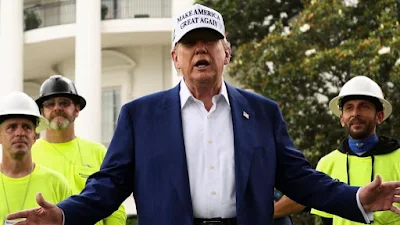Washington / Tehran / Jerusalem – As the Israel-Iran conflict intensifies, former U.S. President Donald Trump has said he has yet to decide whether the United States will intervene militarily, even as Iran’s Supreme Leader Ayatollah Ali Khamenei warned of “irreparable damage” should the U.S. choose to engage.
In his first public remarks since Israel launched strikes last Friday, Khamenei condemned the war as a “huge mistake” and cautioned Washington against any military involvement. "Any U.S. military intervention will undoubtedly be accompanied by irreparable damage," he said in a statement broadcast by Iranian state media.
According to reports in The New York Times citing U.S. intelligence, Tehran is preparing missile systems and equipment to target American bases in the region, should the U.S. join the conflict.
Meanwhile, Trump told reporters at the White House that Iranian officials had reached out proposing a meeting and even suggested a visit to the White House—claims Tehran’s mission to the UN swiftly denied as "baseless." Trump stated, “I may do it, I may not do it. Nobody knows what I’m going to do,” signaling continued uncertainty about his administration’s next steps.
Despite early efforts to distance itself, Washington has ramped up its military posture. The Pentagon has deployed aerial refueling tankers to Spain and Greece and ordered the USS Nimitz to sail from Singapore to the Middle East, while the USS Carl Vinson is already in the Arabian Sea. Intelligence sources also report that B-2 bombers may be positioned to target Iran’s fortified Fordow nuclear facility if required.
Efforts at diplomacy continue. Qatar and Oman are reportedly mediating a ceasefire. The Jerusalem Post reported that Iran has signaled willingness to negotiate, contingent on Israel de-escalating its operations. Geneva is set to host a potential breakthrough meeting between Iran’s deputy foreign minister Abbas Araghchi and European leaders from the UK, France, and Germany. However, Araghchi has refused to meet Trump’s envoy, citing the U.S. support for Israel's actions.
Iran’s Fordow nuclear site—buried deep beneath a mountain near Qom—remains a key target, with Israeli officials asserting that the war “will not end without damaging Fordow.” Only U.S. B-2 bombers are capable of deploying the heavy bunker-busting munitions required to penetrate the site. Israel’s National Security Adviser, Tzachi Hanegbi, reiterated this strategic aim in a televised interview.
In parallel, Israel’s campaign continues with sustained airstrikes, targeting uranium centrifuge facilities, missile component factories, and attack helicopters. Israeli Defence Minister Israel Katz claimed these strikes were aimed at "symbols of power," declaring in a social media post that “a tornado is sweeping through Tehran,” suggesting a push toward regime destabilization.
Civilian casualties continue to mount. Iranian sources report at least 224 deaths, while independent rights groups estimate over 580 fatalities. Israel has reported 24 civilian deaths from Iranian missile attacks. With over 400 missiles launched by Iran so far, only 10% have breached Israel’s air defenses—though critical missile stockpiles are reportedly depleting.
Amid rising global concern, Russian President Vladimir Putin has offered to mediate, warning the U.S. against speculative intervention. The International Atomic Energy Agency has confirmed Israeli strikes have damaged two of Iran’s centrifuge facilities.
As diplomatic, military, and political tensions escalate, the region—and the world—stands at a precipice, with Washington’s next move poised to shape the trajectory of a rapidly unfolding conflict.




.png)
The opinions posted here do not belong to 🔰www.indiansdaily.com. The author is solely responsible for the opinions.
As per the IT policy of the Central Government, insults against an individual, community, religion or country, defamatory and inflammatory remarks, obscene and vulgar language are punishable offenses. Legal action will be taken for such expressions of opinion.